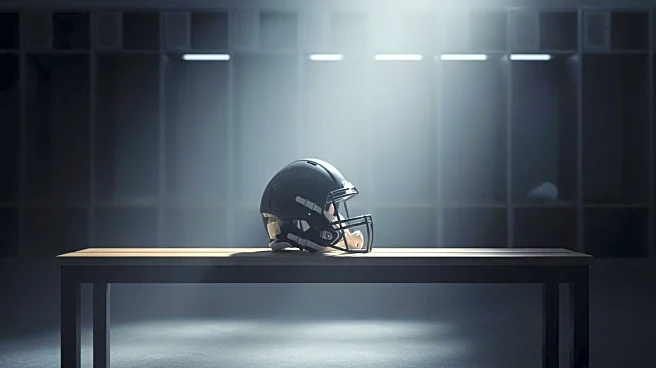What's Happening?
Dak Prescott, quarterback for the Dallas Cowboys, has expressed profound sorrow and solidarity with his teammates following the tragic death of Marshawn Kneeland, a defensive lineman for the team. Kneeland, who was drafted in the second round in 2024,
died at the age of 24, reportedly by suicide after a vehicle pursuit and multi-agency search. Prescott, who has previously experienced the loss of his brother to suicide in 2020, shared that the incident was emotionally triggering for him and emphasized the importance of supporting those struggling with mental health issues. The team held a video call to process the loss, which Prescott described as 'very tough' and a 'tragic loss.' Kneeland had recently scored his first NFL touchdown, highlighting his promising career before the tragedy.
Why It's Important?
The death of Marshawn Kneeland underscores the critical issue of mental health within professional sports, a field where athletes often face immense pressure and scrutiny. Prescott's public acknowledgment of the team's grief and his personal connection to the issue brings attention to the need for mental health support systems for athletes. This incident may prompt the NFL and other sports organizations to reevaluate their mental health resources and support structures. The Cowboys' collective mourning highlights the emotional bonds within teams and the impact of such tragedies on team dynamics and morale. Prescott's advocacy for mental health awareness could influence broader societal conversations about mental health, particularly in high-pressure environments.
What's Next?
The Dallas Cowboys are currently on a bye week, providing the team with time to process the loss before returning to competition on November 17 against Las Vegas. This period may be crucial for the team to regroup emotionally and mentally. Prescott's leadership in addressing the team's grief could lead to increased mental health initiatives within the Cowboys organization. The NFL might also consider implementing more comprehensive mental health programs and support for players, recognizing the importance of mental well-being in maintaining athlete performance and overall health.
Beyond the Headlines
The tragedy of Marshawn Kneeland's death may have broader implications for how mental health is perceived and addressed in sports. It raises ethical questions about the responsibilities of sports organizations to their players beyond physical health, including mental and emotional support. The incident could catalyze cultural shifts in how athletes are supported, potentially leading to more open discussions about mental health struggles and reducing stigma. Long-term, this could influence how sports teams and leagues prioritize mental health resources and training for coaches and staff.















